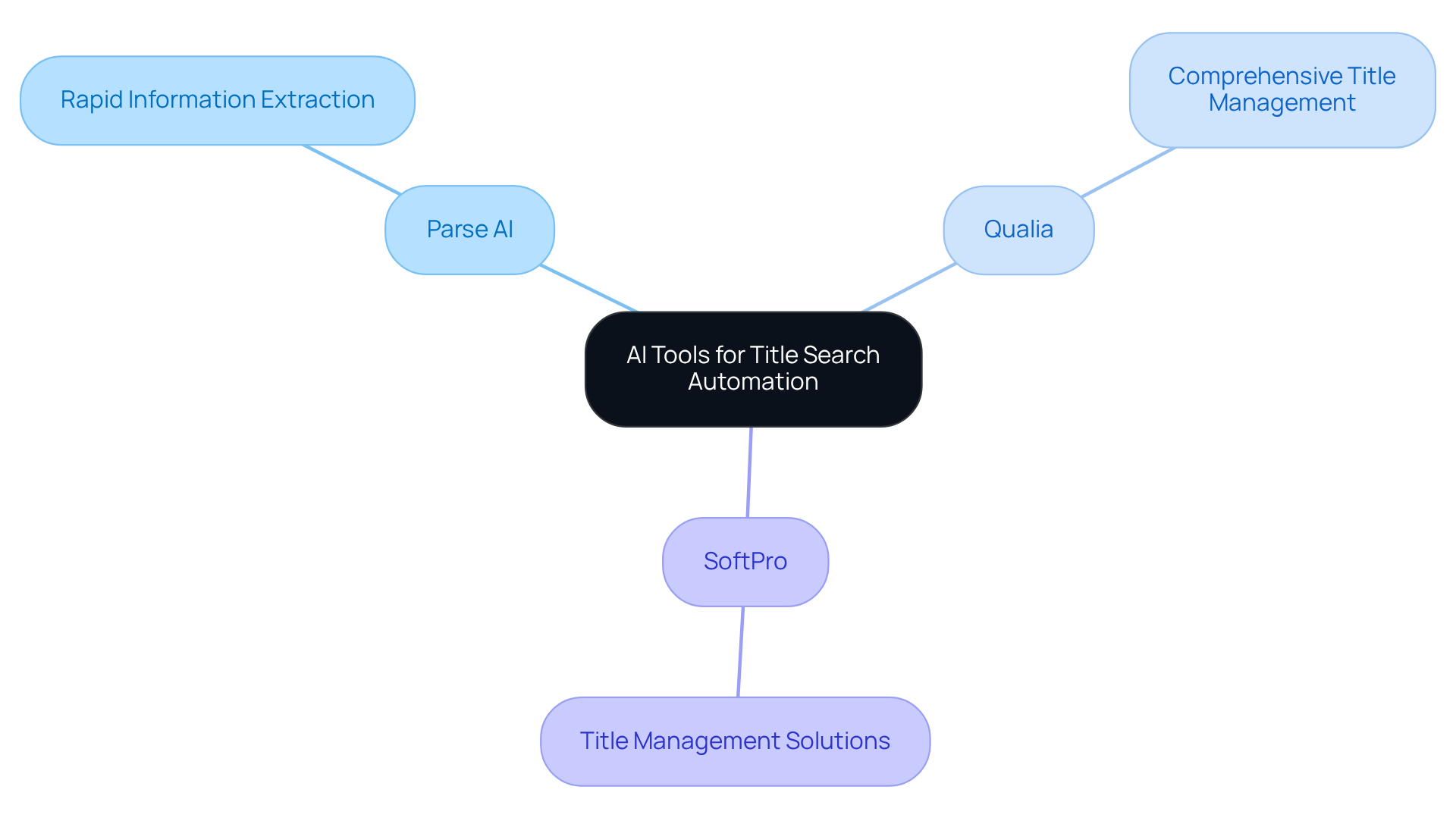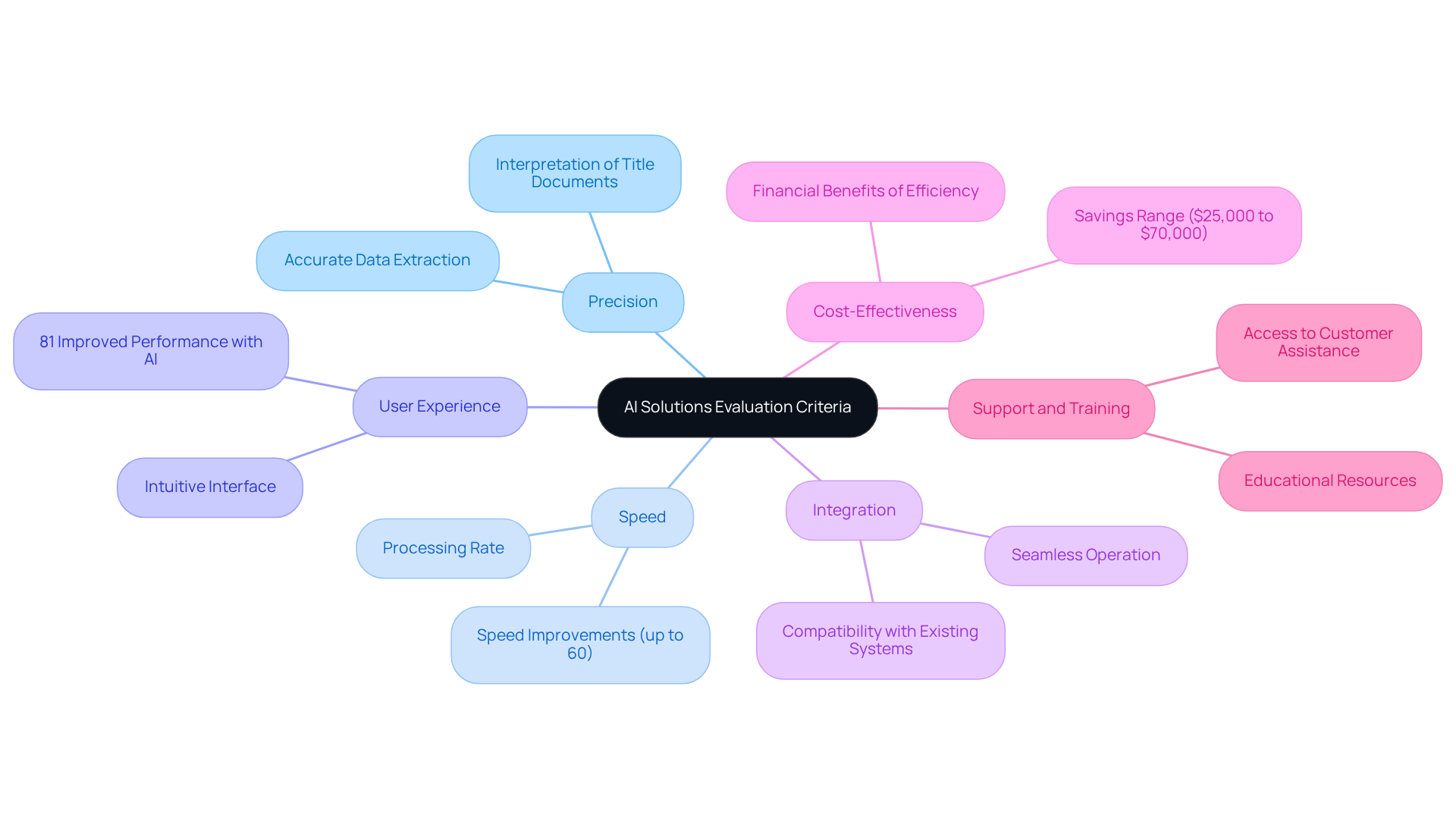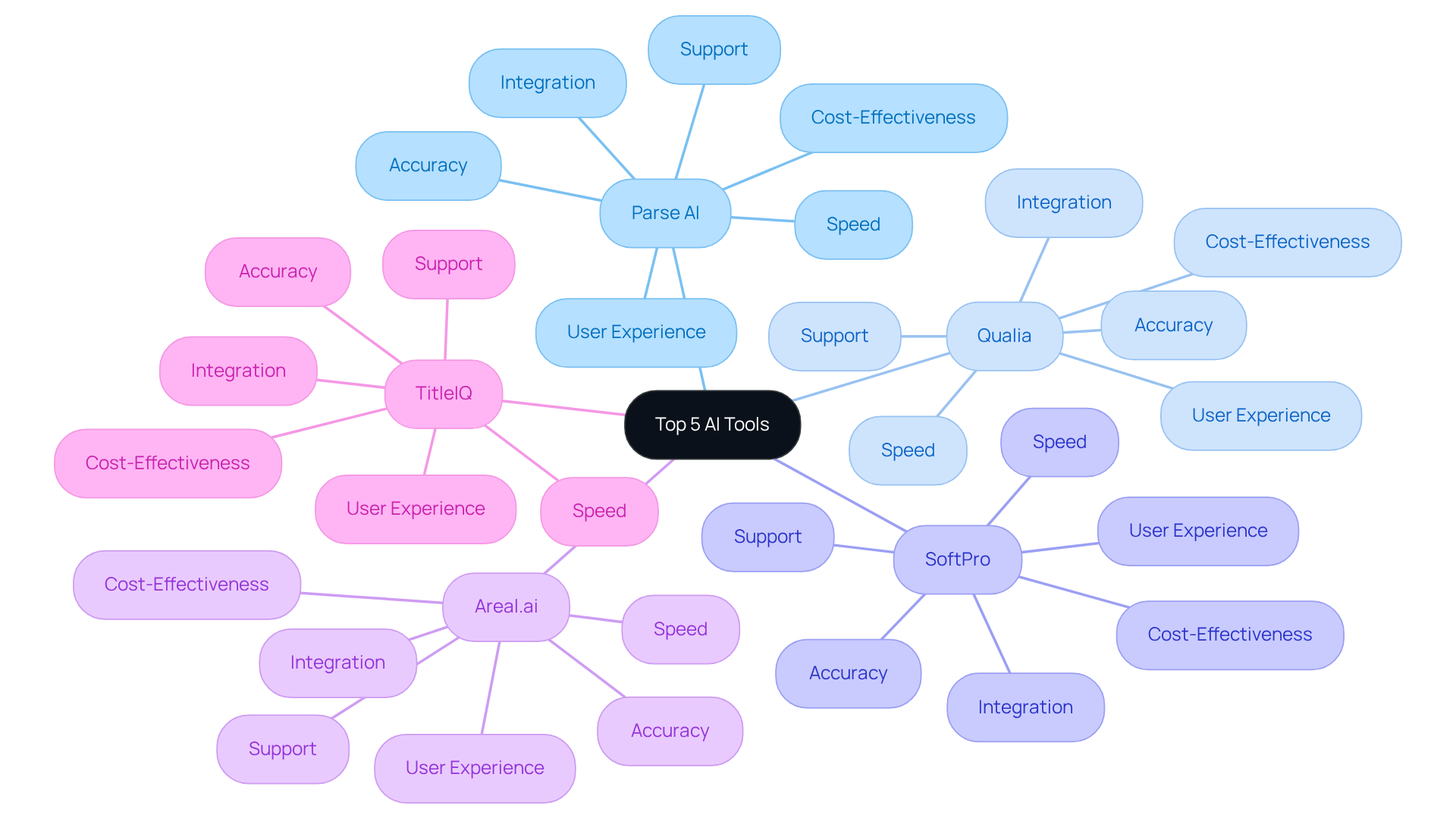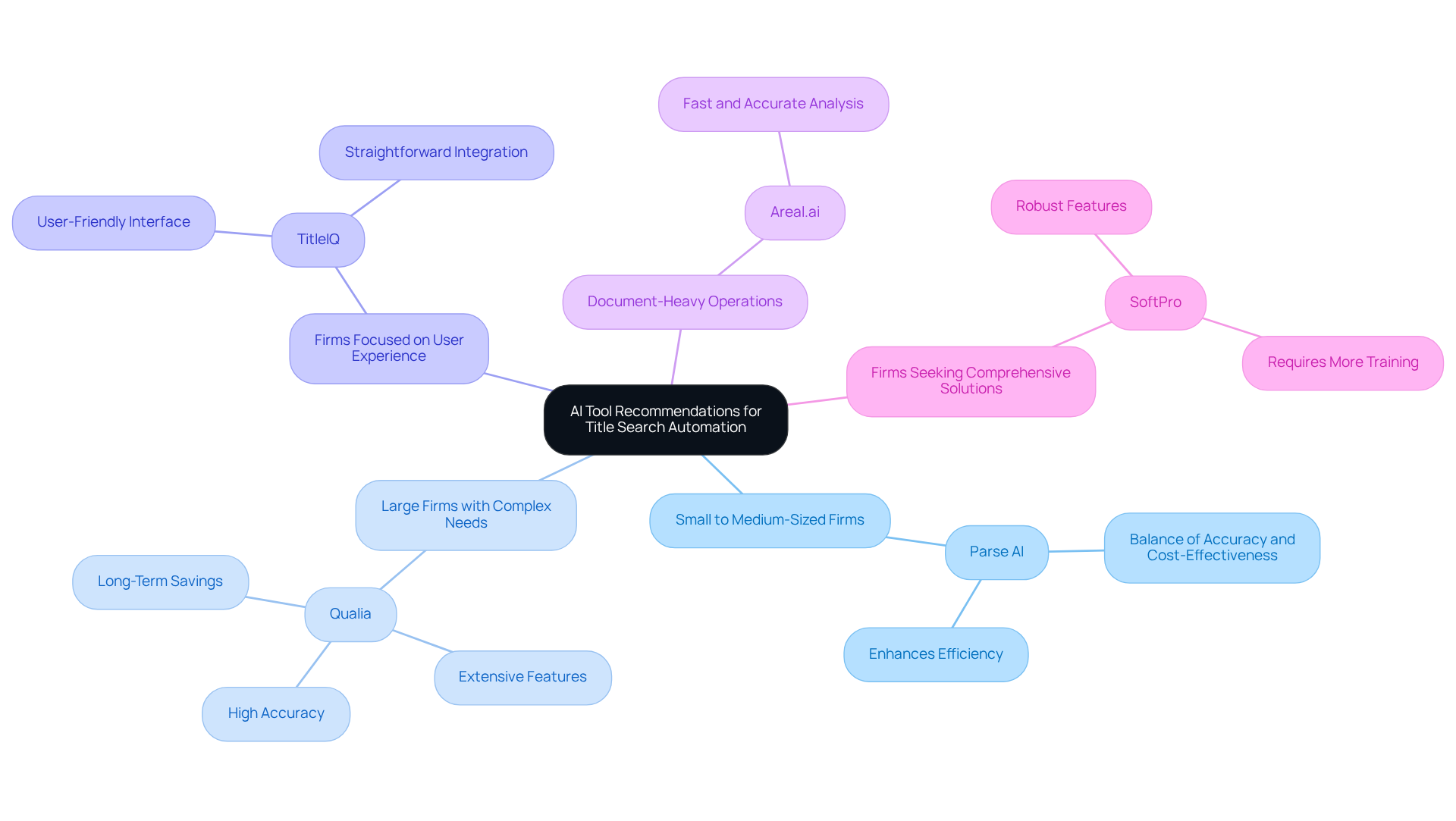Overview
This article presents a comparative analysis of five AI tools designed for title search automation, emphasizing their distinctive features and advantages for real estate professionals. It underscores the significance of accurate title research, addressing the challenges faced in this domain.
By examining each tool's:
- Accuracy
- Speed
- User experience
- Integration capabilities
- Cost-effectiveness
- Support
The article assists firms in making informed decisions tailored to their operational needs and budget constraints. Ultimately, this analysis serves as a valuable resource for professionals seeking to enhance their title search processes.
Introduction
The integration of artificial intelligence into title search automation is revolutionizing the real estate industry, providing unprecedented efficiency and accuracy in ownership research. As professionals navigate a landscape increasingly defined by technological advancement, it is essential to understand the strengths and weaknesses of various AI tools.
Which tools stand out in this competitive field? How can they be leveraged to enhance workflows while reducing costs?
This article delves into a comparative analysis of five leading AI solutions, equipping readers with the insights needed to make informed decisions in their title search automation journey.
Overview of AI Tools for Title Search Automation
AI tools for title search automation have emerged as transformative resources within the real estate sector, markedly enhancing the efficiency and accuracy of ownership research. These advanced technologies, including machine learning and optical character recognition, facilitate the automation of data extraction and analysis from extensive document collections. Notable resources include:
- Parse AI - focuses on rapid information extraction
- Qualia - offers comprehensive title management solutions
- SoftPro - provides title management solutions
Each tool presents a unique approach; some prioritize user-friendly interfaces, whereas others emphasize deep analytical capabilities. This overview underscores the growing trend of integrating AI tools for title search automation into property research, illustrating their potential to streamline workflows and significantly reduce operational costs for real estate professionals.

Comparison Criteria for Evaluating AI Solutions
When selecting AI tools for title search automation, it is essential to consider several key criteria:
- Precision: The device's capability to accurately extract and interpret data from title documents is paramount, as errors can lead to significant issues in real estate transactions.
- Speed: The processing rate of the application is essential, particularly when managing large amounts of data within strict deadlines. AI tools for title search automation can significantly reduce processing times, with some tools achieving speed improvements of up to 60% compared to traditional methods.
- User Experience: An intuitive interface improves usability for researchers, enabling faster adoption and more efficient workflows. Notably, 81% of employees report improved performance with AI assistance, underscoring the importance of user experience.
- Integration: The software's compatibility with existing systems and workflows is vital for seamless operation within title companies, ensuring that the transition to AI is smooth and effective.
- Cost-Effectiveness: Assessing the overall value of the instrument in relation to its cost is essential. Many organizations report substantial savings—ranging from $25,000 to $70,000—after implementing AI tools for title search automation, which highlights the financial benefits of increased efficiency. This aligns with the trend that 77% of companies are either using or exploring the use of AI in their businesses.
- Support and Training: Access to customer assistance and educational resources is important for maximizing the system's capabilities, enabling individuals to fully leverage its features.
These criteria will act as a basis for the comparative evaluation of prominent AI resources in the following sections.

In-Depth Comparison of the Top 5 AI Tools
The following is a comparative analysis of five leading AI tools for title search automation:
-
Feature/Tool: Parse AI
-
Accuracy: High, leveraging machine learning for precise results
-
Speed: Fast processing capabilities, ensuring quick results
-
User Experience: Intuitive interface designed for ease of use
-
Integration: API available for seamless connectivity
-
Cost-Effectiveness: Competitive pricing structure
-
Support: Good support resources available
-
Feature/Tool: Qualia
-
Accuracy: Very high, supported by extensive data sources
-
Speed: Fast, with real-time updates for efficiency
-
User Experience: User-friendly and customizable for diverse needs
-
Integration: Integrates with numerous systems for flexibility
-
Cost-Effectiveness: Higher cost, justified by value-added features
-
Support: Excellent support, ensuring user satisfaction
-
Feature/Tool: SoftPro
-
Accuracy: High, though accuracy varies with input quality
-
Speed: Moderate speed, dependent on initial setup
-
User Experience: Complex interface requiring training for effective use
-
Integration: Limited integration options
-
Cost-Effectiveness: Moderate pricing, balancing cost and functionality
-
Support: Limited support options
-
Feature/Tool: Areal.ai
-
Accuracy: High, with a focus on document analysis
-
Speed: Fast, providing instant analysis
-
User Experience: Simple and easy to navigate
-
Integration: API available for enhanced functionality
-
Cost-Effectiveness: Competitive pricing for budget-conscious users
-
Support: Good support resources for users
-
Feature/Tool: TitleIQ
-
Accuracy: High, utilizing automated checks for reliability
-
Speed: Very fast, optimized for batch processing
-
User Experience: User-friendly, straightforward design
-
Integration: Integrates well with other platforms
-
Cost-Effectiveness: Competitive pricing with good value
-
Support: Excellent support available for all users
This comparison highlights the strengths and weaknesses of each tool, enabling title professionals to select the most suitable option for their specific requirements. Parse AI stands out for its rapid processing and commitment to continuous improvement, making it a strong contender in the title research automation landscape.

Recommendations Based on Comparative Analysis
Based on the comparative analysis, the following recommendations can be made:
-
For Small to Medium-Sized Firms: Parse AI offers a balance of accuracy and cost-effectiveness, making it ideal for firms looking to enhance efficiency without a significant financial investment.
-
For Large Firms with Complex Needs: Qualia is recommended due to its extensive features and high accuracy, despite its higher cost. The investment can lead to significant long-term savings through improved efficiency.
-
For Firms Focused on User Experience: TitleIQ stands out for its user-friendly interface and straightforward integration, making it suitable for teams that prioritize ease of use.
-
For Document-Heavy Operations: Areal.ai is an excellent choice for firms that deal with large volumes of documents, as it provides fast and accurate analysis.
-
For Firms Seeking Comprehensive Solutions: SoftPro is recommended for its robust features, although it may require more training and setup time.
These recommendations aim to assist title professionals in selecting the right AI tools for title search automation that align with their operational needs and budget constraints.

Conclusion
AI tools for title search automation are fundamentally reshaping the real estate landscape by significantly enhancing the accuracy and efficiency of ownership research. The integration of advanced technologies, such as machine learning and optical character recognition, is revolutionizing the practices of title professionals. A comparative analysis of tools like Parse AI and Qualia illustrates the diverse functionalities and benefits these solutions provide, empowering users to make informed decisions tailored to their specific needs.
Key insights indicate that precision, speed, user experience, integration capabilities, cost-effectiveness, and support are critical factors when evaluating AI tools for title search automation. Each tool showcases unique strengths—whether it’s Parse AI's rapid processing or Qualia's comprehensive features—allowing firms to select solutions that align with their operational goals and budget constraints.
Ultimately, embracing AI in title search processes is not merely a trend but a strategic move towards greater efficiency and accuracy in real estate transactions. As the industry continues to evolve, leveraging these advanced tools will not only streamline workflows but also significantly reduce operational costs. Real estate professionals are strongly encouraged to explore these AI solutions, ensuring they remain competitive and responsive to the demands of a rapidly changing market.
Frequently Asked Questions
What are AI tools for title search automation?
AI tools for title search automation are advanced technologies that enhance the efficiency and accuracy of ownership research in the real estate sector. They automate data extraction and analysis from extensive document collections.
What technologies are commonly used in AI tools for title search?
Common technologies include machine learning and optical character recognition, which help in automating the processing of documents.
What are some notable AI tools for title search automation?
Notable AI tools include Parse AI, which focuses on rapid information extraction; Qualia, which offers comprehensive title management solutions; and SoftPro, which provides title management solutions.
How do these AI tools differ from each other?
Each tool presents a unique approach; some prioritize user-friendly interfaces, while others emphasize deep analytical capabilities.
What benefits do AI tools for title search automation provide to real estate professionals?
These tools streamline workflows and significantly reduce operational costs for real estate professionals, making the title search process more efficient.




